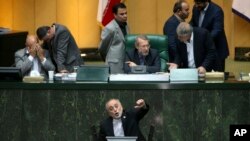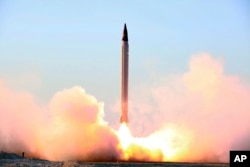Iran's parliament Sunday gave preliminary approval of a bill that allows the government to implement a historic nuclear deal reached with world powers.
Under the bill, the Iranian government will be authorized to withdraw from implementation of the deal if the other side fails to lift sanctions against Iran. Final approval of the measure is expected later this week.
The French news agency, AFP, reported the discussions in parliament were punctuated by fiery debate and allegations from a top negotiator that a lawmaker had threatened to kill him.
Ali Akbar Salehi, head of Iran's Atomic Energy Agency, went on the attack for the government at the end of boisterous clashes where he and other officials were accused of having capitulated.
Hardliners in Tehran often railed against two years of diplomacy that led to the deal. Iran's government says the accord will protect the country's nuclear program while seeing international economic sanctions lifted.
Missile test
Meanwhile, Iran successfully test fired a new guided long-range ballistic surface-to-surface missile — the first such test since Iran and world powers reach the nuclear agreement.
Iranian Defense Minister Gen. Hossein Dehghan said Sunday the missile, named Emad, or pillar in Farsi, was a technological achievement - able to be controlled until the moment of impact and to hit targets "with high precision."
The launch comes months after some Iranian officials voiced concern that the recent nuclear deal could place limits on its missile program.
A United Nations Security Council resolution adopted in July bars Iran from developing ballistic missiles capable of delivering nuclear weapons.
Iran has said its missiles would never carry a nuclear warhead as it has no plans to develop atomic weapons, but military officials have insisted on expanding the country's missile program.






